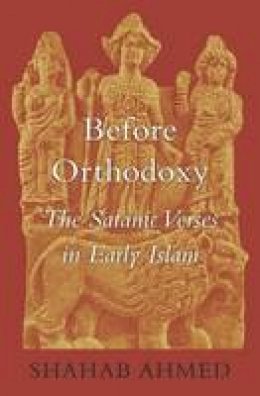
Stock image for illustration purposes only - book cover, edition or condition may vary.
Before Orthodoxy: The Satanic Verses in Early Islam
Shahab Ahmed
€ 79.01
FREE Delivery in Ireland
Description for Before Orthodoxy: The Satanic Verses in Early Islam
Hardback. A controversial episode in the life of the Prophet Muhammad concerns an incident in which he allegedly mistook words suggested by Satan as divine revelation. Muslims now universally deny that the Satanic verses incident took place. But Muslims did not always hold this view. Shahab Ahmed uses this case to explore how religions establish truth. Num Pages: 320 pages. BIC Classification: HRH. Category: (U) Tertiary Education (US: College). Dimension: 23 x 15. .
One of the most controversial episodes in the life of the Prophet Muhammad concerns an incident in which he allegedly mistook words suggested by Satan as divine revelation. Known as the Satanic verses, these praises to the pagan deities contradict the Islamic belief that Allah is one and absolute. Muslims today--of all sects--deny that the incident of the Satanic verses took place. But as Shahab Ahmed explains, Muslims did not always hold this view. Before Orthodoxy wrestles with the question of how religions establish truth--especially religions such as Islam that lack a centralized authority to codify beliefs. Taking the now universally rejected incident of the Satanic verses as a case study in the formation of Islamic orthodoxy, Ahmed shows that early Muslims, circa 632 to 800 CE, held the exact opposite belief. For them, the Satanic verses were an established fact in the history of the Prophet. Ahmed offers a detailed account of the attitudes of Muslims to the Satanic verses in the first two centuries of Islam and traces the chains of transmission in the historical reports known as riwayah. Touching directly on the nature of Muhammad's prophetic visions, the interpretation of the Satanic verses incident is a question of profound importance in Islam, one that plays a role in defining the limits of what Muslims may legitimately say and do--issues crucial to understanding the contemporary Islamic world.
Product Details
Publisher
Harvard University Press
Format
Hardback
Publication date
2017
Condition
New
Weight
28g
Number of Pages
320
Place of Publication
Cambridge, Mass, United States
ISBN
9780674047426
SKU
V9780674047426
Shipping Time
Usually ships in 7 to 11 working days
Ref
99-1
About Shahab Ahmed
Shahab Ahmed taught at Harvard University and was a fellow in the Harvard Society of Fellows and the Islamic Studies Program at Harvard Law School.
Reviews for Before Orthodoxy: The Satanic Verses in Early Islam
This has been a long anticipated book, and the wait has been worth it. It is an excellent study of a complicated theological problem in Islamic religious history that has persisted due to the nature of the sources and the role it plays in defining and redefining the character of Muhammad and the nature of revelation. Both a study on what is arguably one of the most fascinating stories about Muhammad and a primer to the field of Islamic studies and the debate on early sources, this will be an instant classic.
Walid Saleh, University of Toronto [Ahmed] offers the most systematic, critical study of an especially important tradition from early Islamic history, the so-called incident of the Satanic verses.
S. J. Shoemaker Choice (12/01/2017) The battle over Islamic orthodoxy continues to rage on today, making this work of contemporary relevance...A valuable piece of in-depth scholarship on the formation of the early Islamic community and its discourses about Muslim beliefs and practices.
Publishers Weekly (04/13/2017) [Ahmed] was not concerned with whether the Satanic Verses incident really occurred or not. His topic is instead what people believed to have occurred. The results are all the more perceptive (and valuable) for that.
(12/12/2018) Well organized and clearly written, this work is based upon an exhaustive examination of the sources. The analysis is meticulous, the book sober in its conclusions. Ahmed's goal is to explain one aspect of the formation of Islamic orthodoxy by investigating 'how truth happens.' He makes an important distinction between the three types of source material that make up historical memory discourse: sirah or biography; tafsir or Quranic exegesis; and hadith or prophetic exemplum. Ahmed asks good questions
and he answers them in a convincing manner.
David Powers, Cornell University
Walid Saleh, University of Toronto [Ahmed] offers the most systematic, critical study of an especially important tradition from early Islamic history, the so-called incident of the Satanic verses.
S. J. Shoemaker Choice (12/01/2017) The battle over Islamic orthodoxy continues to rage on today, making this work of contemporary relevance...A valuable piece of in-depth scholarship on the formation of the early Islamic community and its discourses about Muslim beliefs and practices.
Publishers Weekly (04/13/2017) [Ahmed] was not concerned with whether the Satanic Verses incident really occurred or not. His topic is instead what people believed to have occurred. The results are all the more perceptive (and valuable) for that.
(12/12/2018) Well organized and clearly written, this work is based upon an exhaustive examination of the sources. The analysis is meticulous, the book sober in its conclusions. Ahmed's goal is to explain one aspect of the formation of Islamic orthodoxy by investigating 'how truth happens.' He makes an important distinction between the three types of source material that make up historical memory discourse: sirah or biography; tafsir or Quranic exegesis; and hadith or prophetic exemplum. Ahmed asks good questions
and he answers them in a convincing manner.
David Powers, Cornell University
